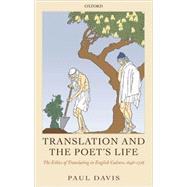Translation and the Poet's Life The Ethics of Translating in English Culture, 1646-1726
, by Davis, Paul- ISBN: 9780199297832 | 0199297835
- Cover: Hardcover
- Copyright: 4/20/2009
Between the Civil War and the early decades of the eighteenth century, English poets of the first rank devoted more of their time and creative energies to translating than they had ever done before or have ever done since. Paul Davis's Translation and the Poet's Life is the first study torange across the entirety of this golden age of poetic translation in England, taking as its organizing principle and object of inquiry the significances of translating itself as a distinctive mode of imaginative conduct. Composed of case studies of the five leading poet-translators of the age -John Denham, Henry Vaughan, Abraham Cowley, John Dryden, and Alexander Pope - it explores the part translation played in their lives as poets and thence in modelling 'the poet's life' during what was a period of transition between early-modern and modern constructions of it. The argumentative method of the book is metaphorical. Each chapter explores the impact on the theory and practice of the poet at issue of a metaphor or group of metaphors broadly current in contemporary translation discourse: in particular, figurations of the translator as an exile, as a child, as acode-breaker, and as a slave; and comparisons of translation to friendship, sexual congress, metamorphosis and trade. The majority of these metaphors were wholly or potentially pejorative: translation remained a controversial practice throughout this period, widely depreciated and stigmatized. Turning translator accordingly forced the five major poets considered in Translation and the Poet's Life to undertake strenuous efforts of self-inquiry and self-presentation; to find new answers to questions integral to their understandings of themselves and their standing in their culture:questions about vocation and career, fame and happiness, responsibility and freedom. Translation and the Poet's Life tells the stories of these personal and public remakings.







